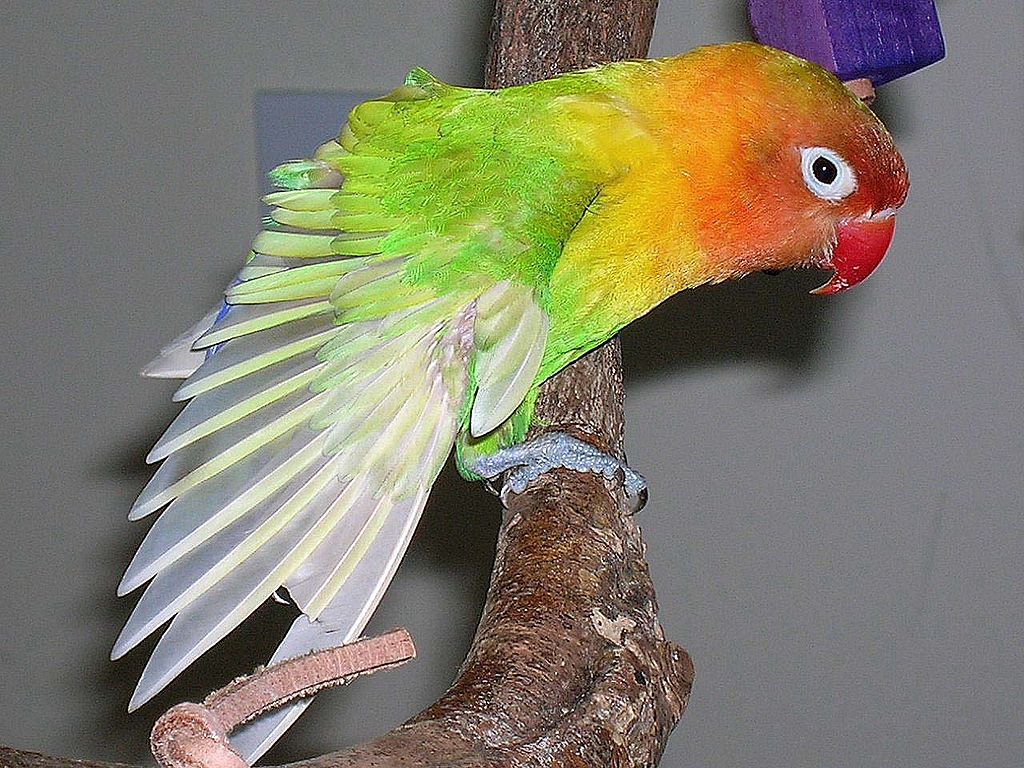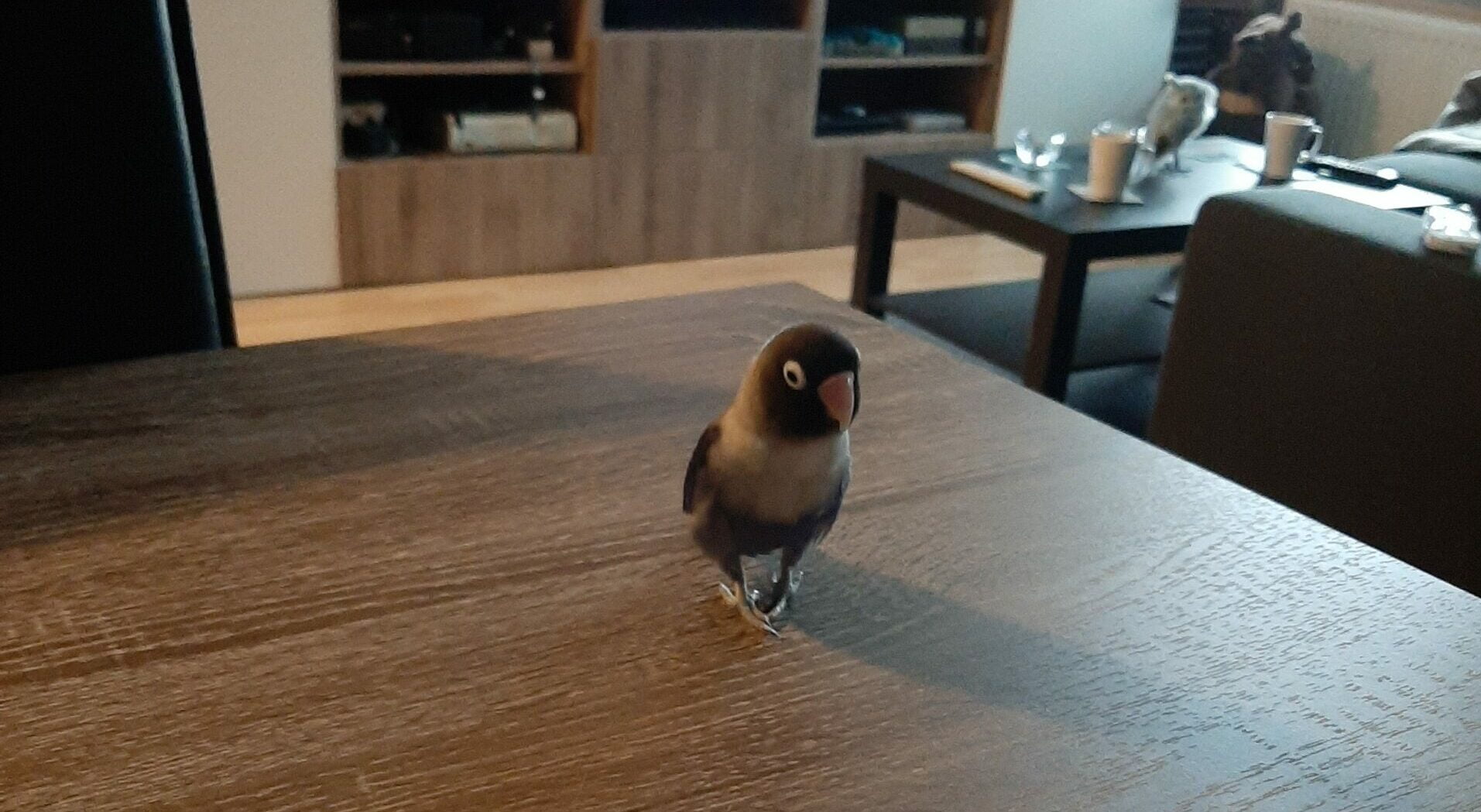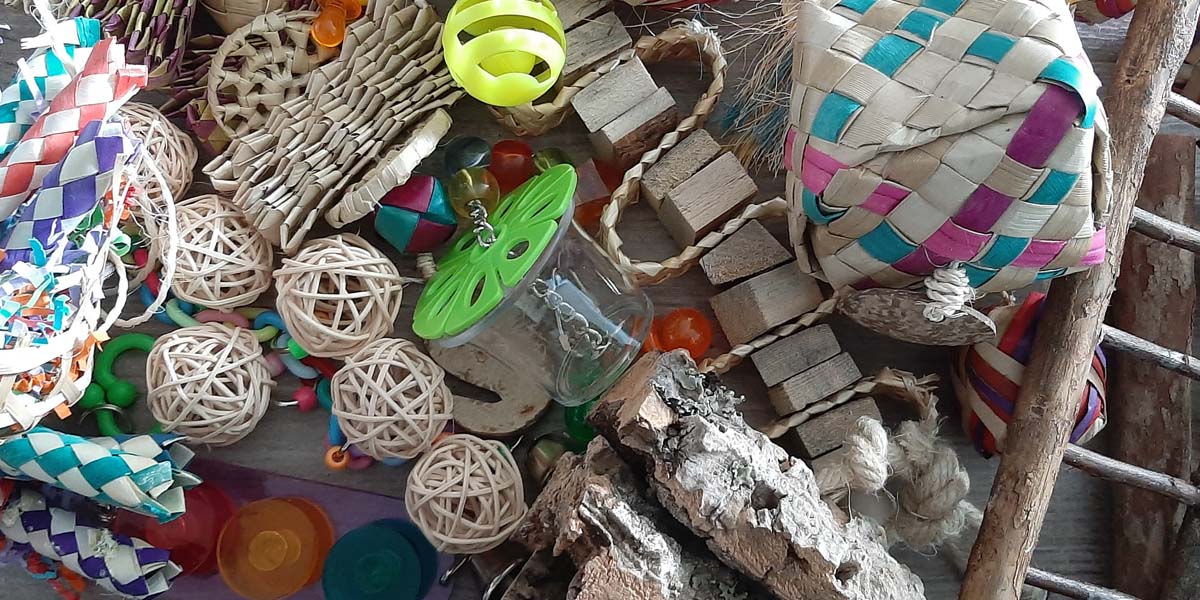A list of safe fruits, vegetables and more for lovebirds
A balanced diet is important for your lovebird’s health. However a pet bird’s balanced diet is not easy and even in food meant for birds you will sometimes find things that your lovebird really shouldn’t eat. So I created a list of recommended food for a healthier lovebird. Also check my list of food you should absolutely not give your lovebird.
Fruits your lovebird can safely eat
Fruits are a great source of vitamins, which are great for your lovebird. However, it also contains lots of sugar which can be bad for your bird’s health if eaten in large amounts so I recommend giving fruit in moderation.
When giving fruit, make sure to remove seeds or pits, as they can be toxic. This counts especially for apples, pears, cranberries, peaches, plums, hawthorn berry, mango, cherry, and nectarine.
Some fruits are very acidic and should be given in moderation. This will be mentioned in the list.
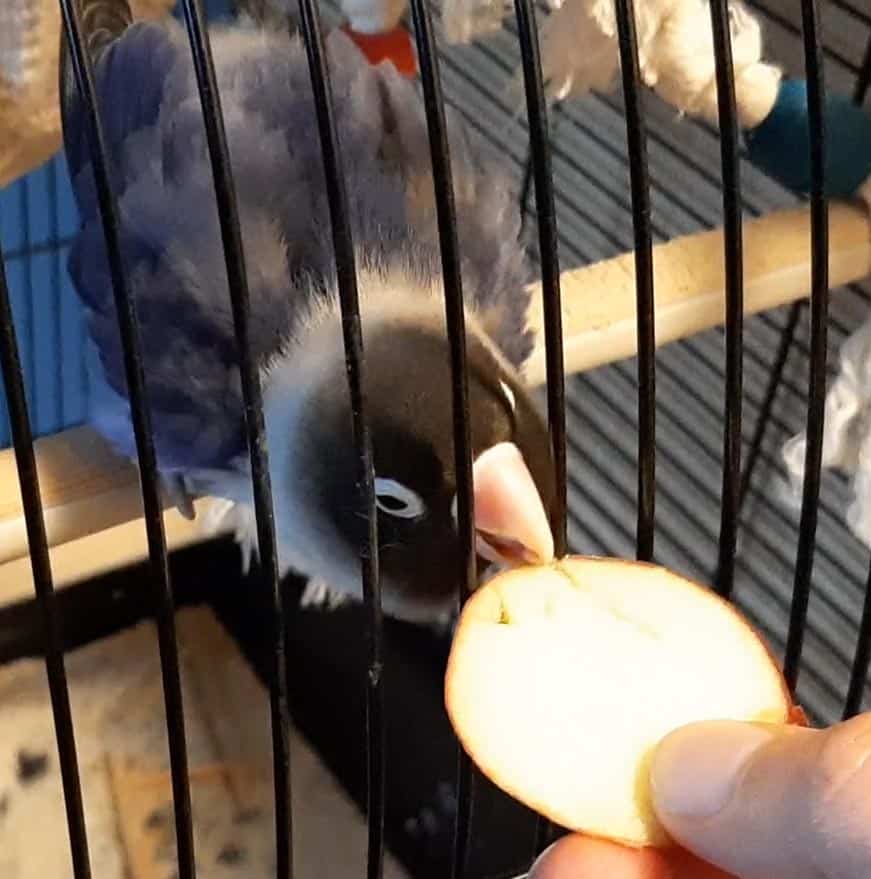
- Acai berry
- Apple
- Apricot
- Asaki melon
- Banana (remove the skin)
- Blackberry
- Blackcurrant
- Blood orange (give in moderation)
- Blueberry
- Boysenberry
- Canary melon
- Cantaloupe melon
- Casaba melon
- Cherry
- Coconut
- Cranberry
- Date (fresh and dried)
- Dragonfruit
- Elderberry
- Fig (fresh and dried)
- Galia melon
- Gaya melon
- Golden dewlicious
- Gooseberry
- Grape
- Grapefruit (give in moderation)
- Guava
- Hami melon
- Hawthorn berry
- Honeydew melon
- Kaki (remove the peel)
- Kiwi (remove the peel)
- Korean melon
- Lemon drop melon
- Lychee (remove the peel)
- Mandarin orange (Clementine) (give in moderation)
- Mango
- Mangosteen (remove the rind)
- Mulberry
- Nectarine (remove the skin)
- Orange (moderate)
- Orange flesh melon
- Palm fruit
- Papaya
- Passion fruit (remove the rind)
- Peach
- Pear
- Pepino melon
- Pineapple (give moderation)
- Plantain (remove peel, cook the green ones)
- Plum
- Pomegranate
- Pomelo (give in moderation)
- Raisin
- Raspberry
- Red currant
- Santa Claus melon
- Star fruit (if your lovebird has kidney problems, avoid this)
- Strawberry
- Tamarillo (give moderation)
- Tuscan melon
- Yellow plum
- Yellow watermelon
- Watermelon
Safe vegetables a lovebird can eat
Vegetables are a great source of nutrition, just like fruit they contain vitamins, but they have less to no sugar compared to fruits therefore they make a great food to give to your lovebird.
Some veggies need to be cooked first before feeding it to your lovebird. Others can be given cooked or raw. If your bird doesn’t like raw vegetables, try cooking it. Make sure it has cooled down enough before giving the food to your bird.
- Acorn squash
- Artichoke
- Arugula lettuce
- Bamboo
- Beetroot (greens as well)
- Bell peppers (red, green, orange and yellow)
- Bok choy
- Broccoli
- Brussel sprouts
- Butter lettuce
- Butternut squash
- Cabbage (red and white)
- Carrot
- Cauliflower
- Chili pepper
- Chili padi
- Chinese cabbage
- Collard greens
- Corn (not processed!) (popcorn without flavoring can also be given)
- Cucumber
- Eggplant
- Fennel (give in moderation)
- Green beans
- Green leaf lettuce
- Hot pepper
- Hubbard squash
- Kale (give in moderation)
- Lady’s finger (okra)
- Little cabbage (xiao bai cai)
- Pandan leaves
- Parsnip (raw or lightly steamed)
- Peas (soaked or sprouted)
- Pumpkin
- Radisch (red and white)
- Red leaf lettuce
- Romaine lettuce
- Snap peas
- Spinach (give in moderation)
- Swede (raw or lightly steamed)
- Sweet potato (cooked)
- Swiss chard
- Turnip
- Yam (cooked, uncooked is toxic for birds)
- Watercress
- Zucchini
Safe nuts for your lovebird
Birds really love nuts but they can be high in fat and too much fat isn’t good for your bird, so I recommend feeding nuts in moderation.
Make sure you give your lovebird unsalted raw nuts.
Nuts are also a great reward to give your bird when training them, just crush up the nut when using it for training.
- Almond
- Brazil nuts
- Cashew
- Hazelnut
- Macadamia
- Pecan
- Pine nuts
- Pistachios
- Walnut
The healthiest nut is almonds. It only has 14 grams of fat per ounce, is rich in calcium, dietary fiber and has the most protein.
Seeds your lovebird can eat in moderation
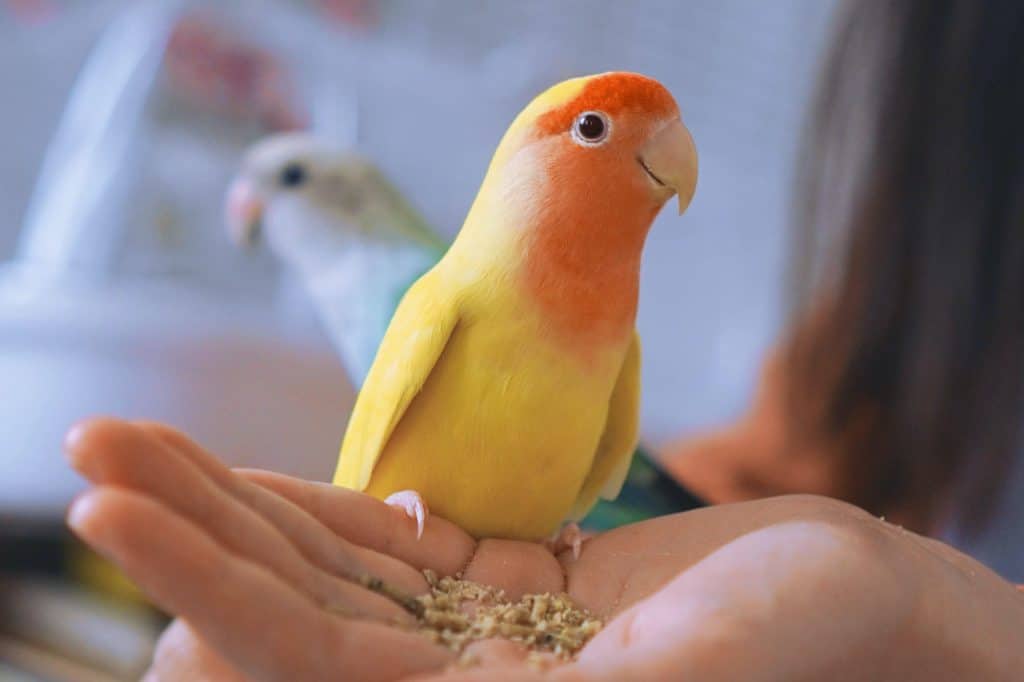
Seeds have a high fat count so like nuts should be given in moderation. If you were told to give them just seeds, you are not the only one. Try switching to more balanced diet to give your lovebird a longer lifespan.
Seeds are low in nutritious values such as vitamins, calcium and proteins.
You can still offer your lovebird seeds, but moderately.
- Broccoli raab seeds
- Buckwheat
- Canary seeds
- Canola
- Caraway seeds
- Chia seeds
- Clover seeds
- Cumin seeds
- Fenugreek seeds
- Flax seeds
- Hemp seeds
- Milk thistle seeds
- Millet (red or yellow)
- Mustard seeds (yellow or black)
- Niger seeds
- Perilla seeds
- Poppy seeds
- Pumpkin seeds
- Rape seeds
- Safflower seeds
- Sesame seeds (unshelled)
- Sorghum seeds (usually ignored by birds)
- Sunflower seeds (black or striped)
- Watercress seeds
Grains your lovebird can eat
Just like seeds, grains lack many essential nutrients and vitamins. Therefore you should add vegetables and fruits to your lovebird’s diet.
- Amaranth
- Barley
- Brown rice (cooked)
- Groats
- Kamut
- Maize
- Oats
- Pasta (dry or cooked but unsalted)
- Quinoa (red, white, black)
- Rye
- Spelt
- Teff
- Wheat
- Wholegrain rice
- Whole wheat cereals (unsweetened)
Flowers that are safe for lovebirds to eat
Giving your bird flowers to eat may sound weird, but birds like the unique textures and colors, however flowers aren’t very nutritious.
When giving your bird flowers, ensure that they are pesticide-free and untreated. It isn't recommended that you harvest the flowers by the roadside, as they could be contaminated. The same can be said for flowers from florists as they are most likely treated with pesticides and not intended to be food.
The flowers can be fresh or dried.
Wash the flowers before giving it to your lovebird.
- Bougainvillea flower
- Calendula flower
- Carnation flower (not dyed)
- Chamomile flower (good for anxious birds)
- Chives
- Chrysanthemum flower
- Zucchini flower
- Daisy
- Echinacea flower
- Hibiscus flower
- Jasmine flower (not yellow jasmine/caroline jasmine/false jasmine)
- Kumquat
- Lavender angustifolia flower
- Lemon
- Lime
- Linden flower
- Nasturtium flower (leaves too)
- Orange flower
- Okra flower
- Pansy flower
- Plum flower
- Red clover
- Rose
- Rosehip
- Sunflower
Safe herbs and spices for your lovebird
Spice up your bird’s food with several herbs and spices. They can be offered fresh or dried.
- Alfalfa
- (Star) Anise
- Barberry root
- Bay leaf
- Basil
- Burdock root
- Celery root
- Ceylon cinnamon sticks (not cassia/Chinese cinnamon, that is not safe)
- Chicory root
- Cloves
- Coriander (seeds and leaves)
- Dandelion leaf
- Dill
- Ginger root
- Holy basil
- Horseradish root
- Lemongrass
- Lemon balm
- Marjoram
- Mint
- Nettle leaf
- Oregano
- Parsley
- Peppermint
- Raspberry leaves
- Rosemary
- Rooibos leaf
- Sage
- St. John’s wort
- Thai basil
- Thyme
- Turmeric



